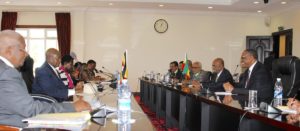- Stay Connected
Egypt asks for more time to consult in River Nile water disagreement
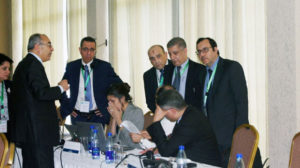
The extraordinary Nile Council of Ministers (Nile-COM) meeting in Entebbe has rejected demands by Egypt for greater control of activities related to the flow of the river Nile.
Uganda, Burundi, Kenya, Tanzania, Rwanda, South Sudan and Sudan were unanimous on Monday in seeking a revision of proposals that Egypt, led by Minister of Water Resources and Irrigation Mohamed Abdel-Ati, had submitted to Nile-COM. Nile-COM is the supreme policy organ of the Nile Basin Initiative (NBI).
According to a statement from the Bile Basin Initiative, Egypt took note of the report on the responses by Nile-Com and asked for more time to study, consult and report back to Nile-COM on their formal position.
Chairman of the Nile-COM Cheptoris, who is also Uganda’s Minister of Water and Environment, told the press after their meeting that their position is that all the countries have equal rights over the water under the Co-operative Framework Agreement (CFA).
“We have rejected demands by the Egyptian government to take full control of the Nile’s water,” said Sam Cheptoris, who is also Uganda’s Minister of Water and Environment. “The other countries also have a say on how the water is used, as they have growing populations that need to use the water as much as the Egyptians.”
The purpose of Monday’s meeting was to facilitate the resumption of Egypt’s full participation in NBI activities that had been frozen since 2010.
The meeting chaired by Cheptoris, was attended by Ministers in charge of Water Affairs from Burundi, Egypt, Rwanda, South Sudan and Sudan. The ministers received a report on the concerns of Egypt and accordingly responded to those concerns.
The Republic of Kenya was represented by the Principal Secretary for Water and Irrigation, while the United Republic of Tanzania was represented by the Deputy High Commissioner to Uganda. DR Congo did not participate.
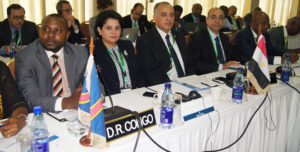
Egyptian officials (right) at the NBI extra-ordinary meeting in Entebbe, Uganda. The Egyptians have asked for more time to consult on their stand on use of the River Nile. PHOTO NBI facebook
Egypt froze its operations in NBI in 2010 after six out of 10 upstream states signed a Cooperative Framework Agreement (CFA) to seek more water from the River Nile — a move strongly opposed by Egypt and Sudan.
The Nile Basin Initiative has ten permanent members — Burundi, Democratic Republic of Congo, Egypt, Ethiopia, Kenya, Rwanda, Sudan, South Sudan, Tanzania, and Uganda. Eritrea has observer status.
The upstream countries said they were “tired of first getting permission from Egypt before using river Nile water for any development project like irrigation”, as required by a treaty signed during the colonial era between Egypt and Britain in 1929. The new agreement is designed to eventually replace the Nile Basin Initiative.
One key recent concern by Egypt is the construction of the Grand Ethiopian Dam, which when complete will be Africa’s biggest hydroelectric dam. Some experts argue that filling and operating the dam will reduce the amount of water that flows downstream to Egypt.
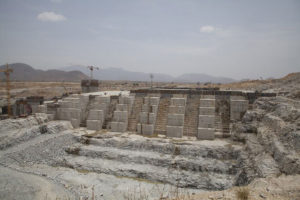
A photo taken on March 31, 2015 shows the Grand Renaissance Dam under construction near the Sudanese-Ethiopian border. Ethiopia began diverting the Blue Nile in May 2013 to build the 6,000 megawatt dam, which will be Africa’s largest. Egypt, heavily reliant for millennia on the Nile for agriculture and drinking water, feared that the Grand Renaissance Dam would decrease its water supply. AFP PHOTO
No reason for fight over water – Museveni
Museveni earlier this month, suggested that because the region’s ministers were failing to resolve the dispute over the waters of the River Nile, a Summit of Heads of State will be considered to address the issue.
He was speaking at a joint press conference with visiting Ethiopian Prime Minister Hailemariam Desalegn at State House Entebbe after bilateral talks early this month.
Museveni clarified that Uganda had not yet ratified the “Nile Agreement” on the use of the River Nile waters, as it is pursuing a maximum consensus on the issue. He said the disagreement between Egypt and other nations on the River Nile is either due to misinformation or not enough discussion.
“The problem of Africa is not water. The problem of Africa is confusion, under-development and ideological disorientation. Instead of quarreling, we should agree on the Nile, develop the population so that we do not waste the water,” Museveni said.
Responding to a question from the press on the “Nile Agreement”, Museveni said “I have not yet ratified because I want to dialogue. To get a consensus, it is better we have more dialogue, more talking. If you preserve backwardness in Uganda, how does that help the Nile?”.
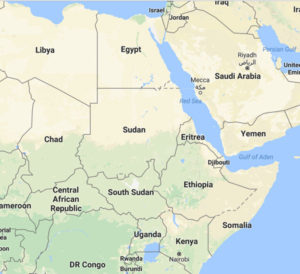
The most recent conflict arose after Ethiopia planned to build dams for electricity that Egypt felt would be a threat on water supply to their country.
The Nile is the world’s longest river flowing 6,700 kilometers through ten countries in northeastern Africa — Rwanda, Burundi, Democratic Republic of the Congo (DRC), Tanzania, Kenya, Uganda, Ethiopia, South Sudan, Sudan and Egypt.
Electricity will save the River Nile
Museveni said the Nile action plan should actually include electrification of the Nile Basin region, as lack of power is actually the biggest danger to the river.
“Lack of electricity in the tropics is the biggest danger. When people do not have electricity, they cut trees for firewood. When they cut trees, the environment is damaged, which affects water flow,” Museveni said.
Museveni said the lack of industrialization, forces many people to remain in agriculture and invade the swamps.
“The second danger to the Nile is backwardness. If you have got backward societies, the Nile will be in trouble. Without industrialization, the people will engage in primitive agriculture, and primitive agriculture means you go into the forest and invade the wetlands.”
He said up to 40% of Uganda’s rain, most of which then flows to the Nile, comes from the wetlands.
The bilateral talks that followed centered on several regional issues including use of the River Nile waters under the auspices of the Nile Basin Summit.
On South Sudan, the two countries agreed on ways for continued stabilization in Juba, using the IGAD, which is currently chaired by Prime Minister Desalegn.
The two countries agreed to continue working together to create an enabling environment for Somalia to build state pillars, establish minimum infrastructure and social services.They also agreed to strengthen cooperation on defence matters.
On trade, they agreed to explore areas in which the two countries can trade with each other especially now that there is a route (road) connecting Kenya and Ethiopia at Moyale – which they can take advantage of.
****
source: The Independent

